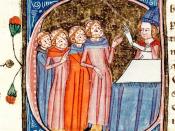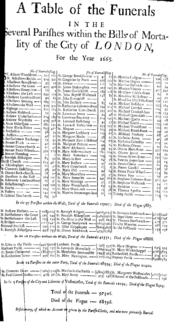The work of Samuel Pepys it can be said offers one of the best contemporary accounts of the Great Plague of London in 1665. Through the study of his extracts dating from the 30th of April to the 30th of November one is able to understand the sheer scale of the Plague. However the extract allows us to learn more about human reactions to disease, not only in the context of the 1665 Plague but with other epidemics that have occurred all around the world. Two other significant 'plagues' are that of the Black Death and the present day virus, Aids. By comparison of the 1665 Plague the Black Death illustrates many similar reactions even although it occurred some 300 years prior to the plague. The example of Aids shows how fundamentally human reactions to disease have not changed even when the 21st century is approaching.
The first two parts of the extract clearly show just how important religion was to the inhabitants of England in the seventeenth century.
Just as the case in the past, present, and the future people will always believe the power of God is the reason for things happening. As the contemporary historian, at the time of the Plague, Thomas Vincent states, 'Terrible things are such great judgements of God.' Its was thought that the Plague was the punishment from God for the sins of the people of London. Indeed the pleas for help and forgiveness in Pepys' article portray this; 'God preserve us all' and 'Lord have mercy upon us.'
However at this period of time, little knowledge was had over the actual cause of the Great Plague of 1665. The seventeenth century had experienced vast economic growth accompanied by a substantial increase in the population, which by 1650 had reached 400,000. This was...


